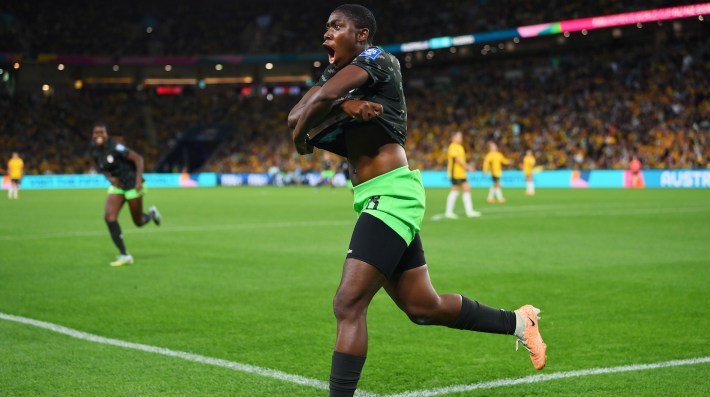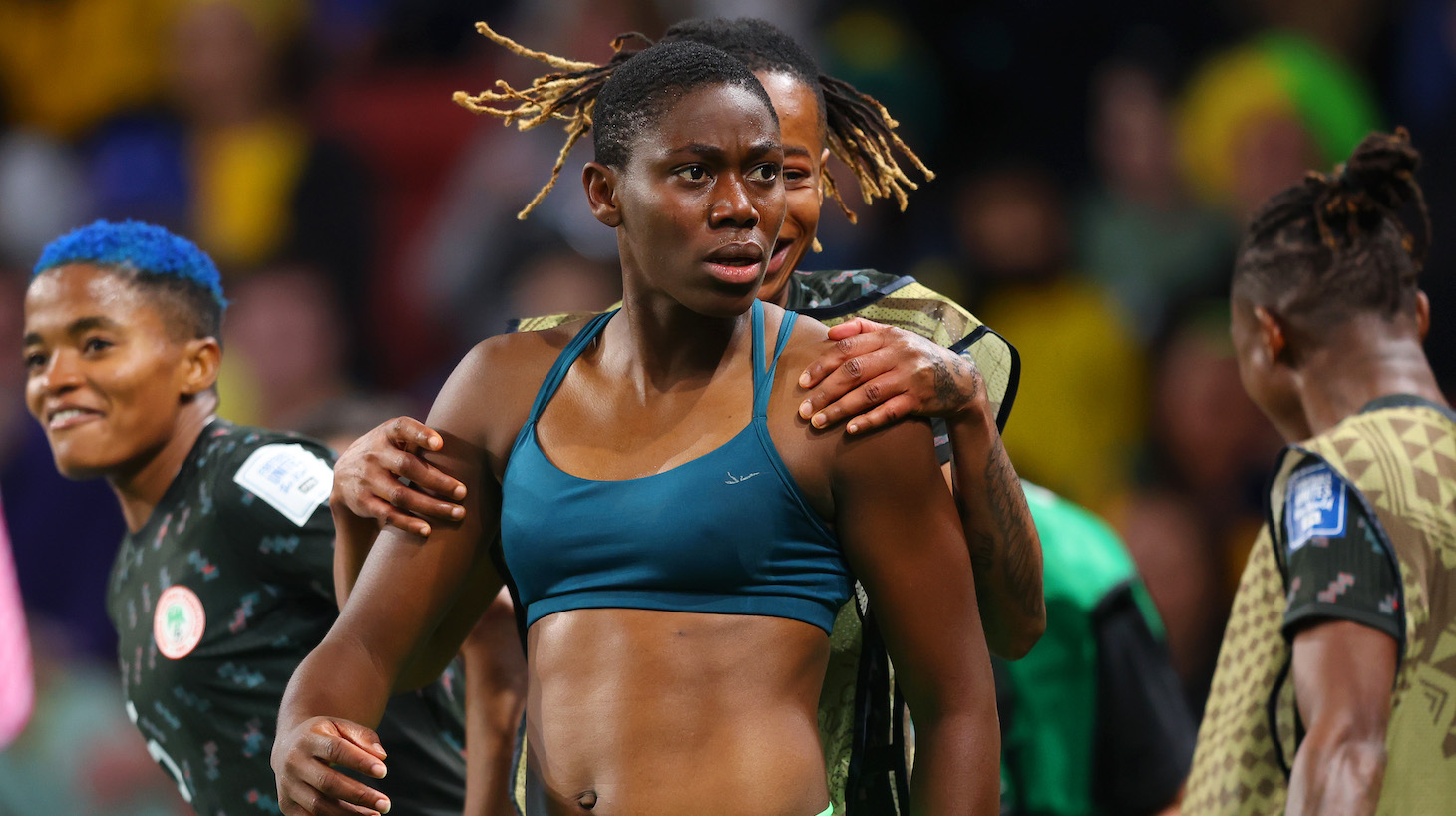A soccer match is one of those places where less is sometimes—oftentimes, even—more. The team that takes the most shots or has the most possession, or even is the match's most dominant side, doesn't always win, and sometimes they who do less do best. In soccer—and especially in knockout tournaments, where the margins are thinnest and the samples are smallest—the team that knows how to take advantage of the specific, individual moments when opportunity arises is often the team that succeeds.
Let's not go too far, though. Sometimes more really is more. Thursday's thriller between Australia and Nigeria was probably the best game of this World Cup so far, in large part because it had so many goals. The match's 3-2 scoreline was the first time this tournament has seen two teams score multiple times in the same match, and Nigeria's ability to score one more than Australia and come away with a huge win can be attributed to their mastery of the few moments that mattered.
From looking at the raw stats of the match, you might imagine that Australia dominated. The Aussies took 28 shots to Nigeria's 11, had almost two-thirds of the possession, won 15 corners to Nigeria's two, completed 367 passes to Nigeria's 171, etc. And Australia really did dictate the match's terms for most of the 90 minutes. The Matildas mostly succeeded at implementing their game plan, which was to keep hold of the ball and bombard Nigeria's penalty box with cross after cross and shot after shot, the idea being that the sheer quantity of their efforts would eventually knock down the Super Falcons' defenses. The host team's problem, though, was that the opponents were content to let Australia more or less do what they wanted, trusting their own defense to withstand the barrage and their venomous attack to offer better, even if fewer, chances to grab a goal or three in the other direction. In that reading, Australia won the numbers but Nigeria won the moments, and in doing so won the game.
More so than any stat, to best understand the match's trajectory you need to know what the vibes of the proceedings were. The match began in a state of Aussie excitement. In front of a raucous home crowd, and no doubt emboldened by the tough but tension-relieving win in the tournament opener, Australia came out gunning. The Aussies pinned the Nigerians deep in their own half and continually booted crosses and shots into the penalty box. While this did create an air of Australian dominance, it didn't last long. The Nigerians quickly adapted to the siege-like state of the early goings, and were prepared to hunker in and clear out everything Australia hooked in.
Nigeria's comfort in defending, the ease with which their attackers found room to run into Australia's half during their rare forays forward, and the Matildas' growing concern after having not converted any of their copious possessions into a goal, meant the match's atmosphere began to turn midway through the first half. The players' excitement turned into nerves, and the packed crowd's energy went from being a lifting force to a burdensome one. The crosses and the shots kept coming, but with a franticness behind them, each missed shot or cleared cross an Australian failure and a Nigerian success. One moment about 30 minutes in felt telling: An Australian corner kick skipped off the head of a Nigerian defender, found Australian winger Hayley Raso alone at the far post, only for Raso to redirect the ball to the wrong side of an undefended goalpost. As the ball hit the ad boards, several Aussies on the pitch hopped into the air clutching their heads in disbelief. Australia was doing more, had just come tantalizingly close to scoring, and had so much time to get a goal, but they looked anything but calm and confident. Meanwhile, with every clearance, every counter that showed promise but didn't quite come off, Nigeria grew stronger.
The five minutes of first-half stoppage time saw the vibes shift back and forth dramatically. Coming into them, it looked like both teams would go into halftime encouraged by their play but maybe in need of a kick-in-the-butt speech to push them to the result they wanted. But right as stoppage time started, Australia intercepted a poorly hit Nigerian goal kick, rushed out on a quick attack, and found a goal through an Emily Van Egmond strike. Australia's numbers had paid off, and the Aussies were flying. But it didn't last long, not after a quick attack of the Nigerians, who'd recently started venturing out in attack further and in bigger numbers, ended with the equalizing goal. It was one of the only times the Super Falcons had really threatened Australia's box in that first half, and it ended with a goal. The Nigerians had waited for their moment, pounced on it when it arrived, and went into halftime the happier team.
The second half picked up basically where the first half had ended. Australia kept pushing the ball forward, crossing it into the box, shooting, and looking distressed when they didn't score. Nigeria continued defending solidly, countering after Australian turnovers (extending that late-first-half adventurousness), and never letting the moment grow bigger than what they were prepared to handle. Things shifted even more in Nigeria's favor after they subbed on superstar Asisat Oshoala in the 64th minute. Oshoala is one of the biggest difference-makers in the sport, and certainly became the best player on the pitch the moment she stepped onto it. With a player like that out there, Nigeria became even better equipped to meet the game's moments as the chances arose.
Sure enough, one minute after Oshoala came on, Nigeria won their first corner of the match, and after a series of looping headers, Osinachi Ohale nodded the ball over the Australian goal line to give Nigeria the lead. Not even 10 minutes later, Oshoala chased after a hopefully hit ball over the top of Australia's back line, pressured Alanna Kennedy into an awful error, and coolly flipped the ball into the net from a tight angle. In a match in which it appeared Australia had been "dominating," Nigeria had somehow wound up with a commanding 3-1 lead. Oshoala, always one equipped to answer the call of a moment, capped her fantastic goal with an instantly iconic celebration.
POETRY IN MOTION FROM ASISAT OSHOALA 🇳🇬 pic.twitter.com/U7l782MGwA
— FOX Soccer (@FOXSoccer) July 27, 2023

Australia kept flailing wildly to get back into the game, to not much avail. The Matildas took nine more shots after Oshoala's goal, most of which didn't cause Nigeria too much trouble. Only one attempt found the back of the net to get the score within one, but it was in the 10th minute of 11 minutes of stoppage time. Too much, too late.
Nigeria makes for a cool winner for several reasons. It's always nice seeing an underdog do well in a tournament, and doubly so when they're from one of the less heralded confederations. But I also think Nigeria's approach to the match, enduring the hard times and looking to win the game in moments rather than on aggregate, is a good corrective to some of the logic you'll find out there nowadays. The logic of "more shots means better play," and expected goals, and "they were lucky to score there" operates with assumptions I find troubling and, thankfully, wrong. Goals are not actually scored by accretion. A shot that misses but has 0.3 xG does not in fact get you closer to converting a chance later on. Soccer is not like gravity, where behind an apple falling from a tree there is an equation that accurately reflects the underlying rules of reality, and the explication of which will help you predict exactly when an object of X weight dropped from Y height will hit the ground. (Hell, not even gravity is actually like that, but that's another story.) Soccer is best understood on human terms, like a team being first energized and then weighed down by a large, sympathetic but anxious crowd, and another team feeling strengthened from its place of supposed weakness and using that to win. A goal and a game are moments, and they are won or lost within themselves.






